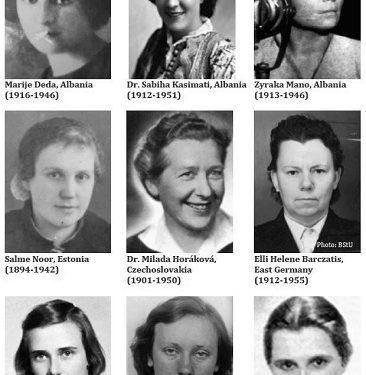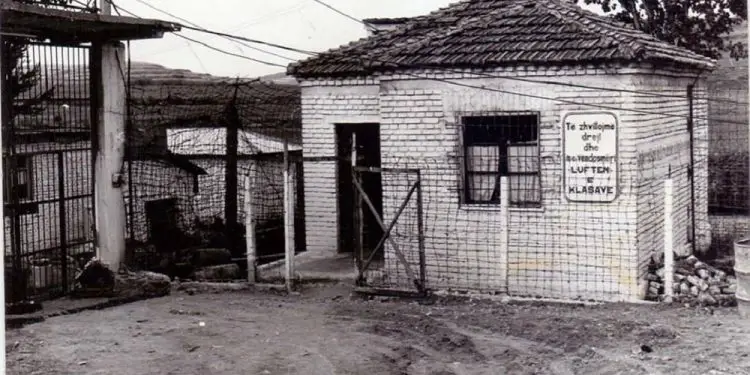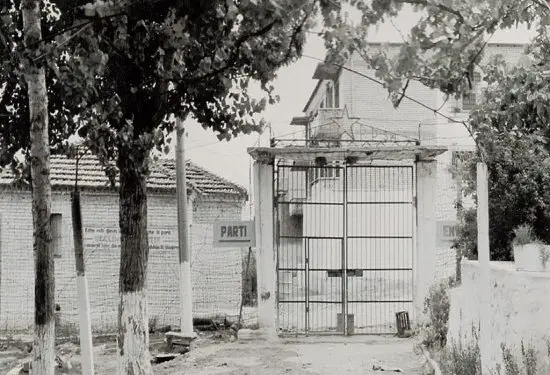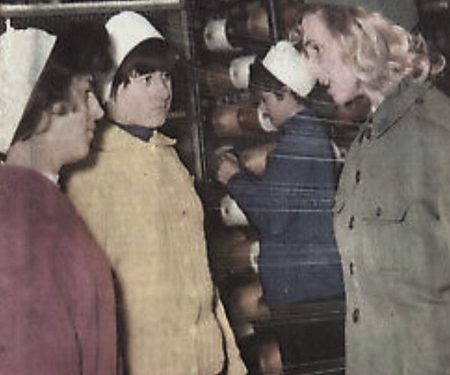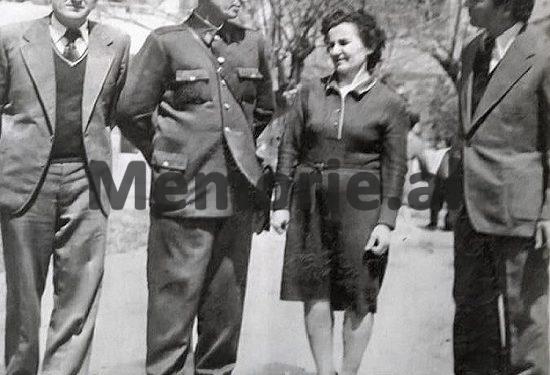By Violeta Murati
Memorie.al / A delicate but at the same time taboo debate has been open for some time in the media, related to the rape of women in the dictatorship, dividing into two camps the “witnesses” and the persecuted themselves. Did the investigators, the prosecutors, commit sexual abuse on the women in the investigative process, or in prison?! Some say that this phenomenon did not exist, as everyone was spying on each other. Others are of the opinion that this phenomenon existed, but not in the investigator or prisons. But no witness or victim has yet denounced the rapist, how much truth is there in this story.
The case of Alida Hisku has been dropped, but it has simply fueled the debate. One thing is certain: the phenomenon existed; the rapes were committed, especially by the heads of the Security, not ordinary investigators. The newspaper “Mapo” sheds light on this debate, through two people in different historical positions on the dictatorship. Nevila Nika, specialist, historian and former director of the State Archive, says that; there is no doubt that such painful events have happened, and whoever has gone through this traumatic experience, history has proven that it was difficult to denounce it.
On the other hand, one of the most productive researchers of the terror of the dictatorship, convicted on the charge of overthrowing the popular power, by profession a mere history teacher, Agim Musta, said that the phenomenon existed, but the rapes did not happen in the investigator or in prisons. For Musta, the whole open debate is a game by the elements of Sigurimi, or their puppets, to lower and denigrate the dignity of the persecuted again, that: “this phenomenon is playing like a game, in the hands of the former Sigurimi, to say that; such was the layer that did everything, accepted everything…it’s a secret, camouflaged game”.
Musta also confessed for the first time about the “secret houses”, which served the heads of the Security for the “special investigator” especially for foreign agents, and in some cases, for sexual abuse, against beautiful women, with problems in the profession, or convicted. An unknown statement, Musta made, saying that; these houses were sometimes used for orgies by the high nomenclature.
Agim Musta: Security chiefs, “secret house” for the investigator, orgies and rapes
It is a taboo matter, not spoken out loud like now, about the abuses of women in the dictatorship.
Mr. Musta, there is a lot of talk about their rape, while less often; there is talk about the torture and abuse of convicted women. We believe that there are two sides to clarify?!
We must clarify that the phenomenon of the persecution of women is self-explanatory, and the story of Alida Hisku is fictional, as long as it was proven that she was not in prison. So why not ignore this storm in a glass?! During the communist dictatorship, women were persecuted. This persecution was divided into two sides: persecution with criminal penalties, deportations, deportations; and persecution with hard work, with unemployment, with the lack of granting the right to study, etc., etc. So, we have to make some separation, despite the fact that the dictator said that; Albania is a country that enjoys all rights, especially the Albanian woman.
In fact, the Albanian woman has been very backward. But, this emancipation that was made to the woman, suffering at her expense, a persecution be it moral, political, financial, etc. Thus, during the communist regime, we can take it from the beginning of the communist party, according to not exact statistics, but approximately, 400 Albanian women were executed and killed during the War.
I have written some of them in the book “The Object of Communism”. But, those who have been a symbol, truly anti-communist and fought for the right of the Albanian woman have been few. Musine Kokalari is mentioned, which is a symbol even for Eastern Europe. She is the only woman, in Albania and in Eastern Europe, who has served 38 years in prison.
The issue of women raped in the dictatorship is creating a cacophony, and has become a phenomenon, how much truth do you think there is in this?
There is only one truth, since the communist terror, and especially the methods used by the State Security, had no limits. They had full authorization to use methods against the so-called “enemies of the people”. But to be precise, and true, it was not a widespread occurrence, to become an actual phenomenon that they may have existed. These were very rare cases.
Why do you consider rare cases, is it about the investigator or prisons?
Because in prisons, in the investigator and the prosecutor, there was great vigilance, even among each other. Everything that was done was reported. Even the prisoners had the right to write letters to the investigators, without being censored by the Command of the Camp, the prison or the investigation. So, they were afraid that if they found out, for their own reasons, to keep the secret, they would even punish them severely.
As a phenomenon, I certainly cannot rule it out. I have these examples: Zhaneta Agronaj, a poet teacher, was arrested and sentenced to 10 years, and from the torture she came out of prison insane. There is another, journalist, Bianka Balliçi, from Austria, married to an Albanian; she also went crazy from torture.
So, you are with the thesis that there was no rape in the investigator, but there was only torture against women. Can you tell us what kind of torture they were?
No, no, as a phenomenon, it was not rape in the investigator. Torture yes, they were severe for women. First, they were of a nature that affected her personality. The interrogator’s language was quite derogatory, to lower her personality, sorry for the expression, they called her: whore, whore…what they didn’t say to her in the interrogator. Physical punishment was not excluded, shooting with the palm of the hand, putting them in barrels, in water with ice, and many other tortures, quite severe for them.
You have been convicted, and you have a long experience in prison, the most productive researcher of that system and quite cautious as far as communist terror is concerned. In the last book “Gjema e Communism”, you gave a statistic that 20 types of torture were used by the investigation. But, as concluded by others, there is no mention of rape against women, why?
It is true; I have not mentioned this aspect. This is because I had no data on the rape of women, at least from contacts with imprisoned women, after the 1990s, such as Marie Medicina who suffered 18 years in prison, but also with many other convicted women. From these women, I have never received any denunciation of sexual assault.
But, I cannot say that, absolutely, such a thing did not happen. It may have happened but, in rare cases, and these could have been done only by the heads of the Security, who had full powers. Even these, logically, did not do this in prisons, but had secret houses. Even women, who were not prisoners, were taken there.
Have there been cases?
Yes, she was an accountant who had had problems with her finances. Back then, you were punished for theft, from 5 years to death, from 30,000 ALL to 7,000 old ALL. In the case I’m telling you, the head of Security told him with this abuse you did, in order to close it as a case, they had to submit to him. There have been such cases, they were recorded. Especially, this was for beautiful women. But this was done only by the heads of the Security; the most well-known was Nevzat Hasnedari.
I have a “memory” from him, with the blade of a ruler that he shot me in the head in the forehead, in the interrogator (shows the sign). He was a great specialist in torture. They even took him to specialize in China, but the Chinese remained silent. “Let us learn from you”, they told him, giving him an old book, with the tortures that were used in China, 3 thousand years ago.
So you say that, as far as the convicts are concerned, there were no cases where the victims of rape were beautiful women, or blackmailing women who might have problems at work or professions?
In a TV show, it was me, Hasan Luçi, and Max Velo, the latter addressing him: Tell me, why was I arrested, I was an apolitical person and I was looking after my work?! He replied that the file had to be seen. Velo insisted that Hasan had to know why he had been punished. I told him the reason why they put Max Velo in prison, because he was out of time, with his hair dyed with glitter, with colorful jackets, he also had a beautiful girlfriend…! So to eliminate Max, they took two witnesses quite easily, made the file and sentenced him to 7 years, for agitation and propaganda. This is it, I said to Max Velo, who probably knows, but he didn’t want to say it.
This means that there are other cases where boys were punished for being modern, or because they had a beautiful girlfriend, fiancee or wife?
This also happened. There have been rare cases, but it has happened, I say with conviction. For example, Lluk Kaça, the famous baritone, was sentenced to prison. He was a completely apolitical man, finished in Moscow. He had a very beautiful wife. So in order to eliminate him, they condemned him, made a file on him.
Is this contingent considered politically persecuted?
These are politically persecuted, because they were imprisoned on political charges; agitation and propaganda, escape, conspiracies, etc. For example, I was accused that, I was together with Pjetër Arbnor, that we wanted to overthrow the people’s power.
This was an accusation concocted by the investigation, but did it not coincide with the real activity against Hoxha’s policy?
No, of course not.
Is it time to clarify this phenomenon?
I say that it was not a widespread phenomenon. It was very limited, so needless to say, it’s not worth the rent burden. There are many other moments to clarify in this aspect, especially for women who have been tortured at work, with 12 hours.
What were the other cases where women were used and abused in the dictatorship?
There have been cases when women were tortured in hard work, spending 12 hours at work. There were of course other less controlled cases, such as the internment camps, where women were really abused. But they knew that there was no reaction to her, or to the investigators. But even these cases were rare. Our social mentality calls it a great sin against her. She is also a victim of many of those, which were rare, that they have declared. They do not dare to speak even now, after 25 years. No one should even expect that they will be able to report the rapes.
How were women recruited as spies?
The first target they addressed were the families of the persecuted, they were put under great pressure. Likewise, beautiful women were also targeted, who were also a little mobile, who did not mind having erotic relations with the heads of the Security, although they were rare; they were honest and very good women, who were taken for exile, just for one reason, that their brother or some relative might have escaped; they also used the women who were employees but abused them. For this, they had several secret houses, where they were blackmailed.
How was he blackmailed or threatened, by whom?
The blackmails were of various forms, very sophisticated. For example, they were blackmailed with layoffs, not giving their children the right to study. The dictatorship had extraordinary, unimaginable means and blackmail. In Albania, the worst methods have been used, all of them.
You talked about secret houses; no one knows about them, what were they?
They were not talked about, but the people of those areas knew of their existence. From the investigations I have done, in prison and outside, I have verified their presence. There were secret houses in Krujë, in Gjirokastër, in Tirana, there were three or four such houses in Shkodër, etc. In their knowledge, it was only the high nomenclature and the heads of the Security. Even the usual investigators, operatives, had no idea. These houses were used for people coming from abroad, to discover the purpose of their arrival in Albania. They were used to recruit Albanian Security agents, to send them abroad.
They were instructed for a month, or two months. They were secret places for which no minutes were kept by the investigators who were there. In the trial of Kadri Hazbi, many horrors have come out about what they did in these secret houses. Wherever the directorates of the investigators were located, there were also secret houses. The investigation was also done there. Even in the “Palace of Brigades”, below, there were dungeons. Many Greek officers, Albanians from Kosovo and Macedonia, used to be investigators. Even in Marikaj, there was a secret house, in the middle of a forest, the villa of the Toptanas, there were also orgyras, from the high ones.
Were these secret houses used to sexually abuse women, especially by top bosses? Are there any complaints about what happened there?
Yes, there were times. From what I heard, I know that they used to go there for orgies, where they took beautiful girls or those who were not arrested. But they also sent convicts. To this day, as far as I know, no confession has been made about this house. I think that our fear and mentality still exists, which is also related to dignity, so these have not been opened.
Were there strong orders for the Security, or measures to be careful, not to commit acts of rape?
This order existed only for ordinary investigators, especially after the 1950s.
You say that the ordinary investigators, but the bosses in high ranks, had “freedom”?
Of course they knew, they were passing in silence. We have the case of Feçor Shehu, he was deputy minister, and he had a woman who was his lover. She was connected to a “Dinamo” goalkeeper. Feçor finds out and puts one of his men, killing him in a bunker. When the goalkeeper’s father went to Enver Hoxha, he replied: “Well, such things happen everywhere”!
Yes, they were in charge, the bosses. But Enver Hoxha also had the knowledge, as he kept them as facts, to compromise them.
There is a hypothesis that the issue of rape of women is a game of the Security, to give the last blow to the persecuted, to their dignity. Does this happen today?
Yes, I absolutely agree, that this phenomenon is spinning like a game in the hands of the former State Security, to say that; such was the layer that did everything, accepted everything, denigrating one of the layers that suffered the most from the regime. I am of the opinion that even now, their fingers open these words, that Security certainly does not exist now. I do not say that it is a game, but I say that elements of the Security, participate in this campaign. I understand that this is a very camouflaged, very stealthy game.
How good are you at opening files?
I am in favor of opening the files, first of all the Archives of the Ministry of the Interior, the main files on how many Albanians have been killed abroad, nothing is said about this. Security has killed many people abroad, who were poisoned. Regarding the agencies that the Albanian state sent to Greece and Yugoslavia, for the Yugoslav agents in Albania, who played a double game. Once these are opened, the files of people who lift weights should be opened, and not the others, as it creates chaos, and brings people into conflicts, about who has spied on each other. Time has passed for them, they have been exhausted in newspapers and books, and I call it excessive.
Your case, why were you convicted?
I was convicted in 1962, by the Military Court of Tirana. The court was a sugar factory, with five primary classes. He had sentenced about 400 people to death from 1945 to 1962. His name was Llazi Polena. We were a group of teachers, when Albania broke up with the Soviet Union in 1961, we thought the country, the regime, would be overthrown, we only had eight days of bread. We did not think that Mao Zedong would come out and give Enver Hoxha, lek in hand, 400 million dollars. Enver Hoxha bought wheat from France to save himself from hunger.
In prison, a person brings out the character exactly, as it is, even the biggest coward, faced with this situation, and had courage. Even the biggest coward when he lacks bread, he is hungry, he does not ask. Enver Hoxha knew this, and he brought wheat, 25 large works were opened. I was sentenced to 13 years in prison, they took me to Burrel. I learned a lot there, as things were told as they happened. Later, punishments began in prisons for agitation and propaganda. In the end I was sent to Spaç, doing 11 years. Then an even heavier prison, they no longer gave me the right to work, leading me to a hard job, there in the Dajti quarry.
***
Nevila Nika: The phenomenon of rape has existed, but it is difficult to denounce it
A taboo debate has been opened, said but not as loudly as now, about the rape of women and girls in communist prisons. How true is this?
There is no doubt that such painful events have happened. Even for the tortures suffered by the prisoners in our country or the internees, especially for those who were charged with political charges, it took quite some time for the victims to confess. Many of them have spoken in close circles, others loudly, but still I think the case of rape is more serious. Anyone who was lucky enough to go through this traumatic experience, history has proven that it was very difficult to denounce it, even more so publicly.
In a televised debate, where you were also present, the singer Sherif Merdani said that; after the 70s, no one dared to rape in prisons or the investigator, after being shot by Enver? Is this proven?
Personally, I don’t know any prosecutor, investigator or official who has been shot or even sentenced to prison, for having committed this inhumane act. If Mr. Merdani proves it to us, I would be grateful.
You have spent your life almost as a specialist and historian, as well as in the position of head of the State Archives. Can you tell us if these data exist documented, how the State Security and the investigation functioned, reports when before them, it was women who were punished?
It is understood that it is not easy to find documentary evidence for these cases or even for the exercise of physical and psychological torture. The organs of the dictatorship could not leave traces of their deeds and for the simple fact that, according to the Criminal Code, of the Criminal Procedure, this activity was not allowed, which means that ‘de jure’, nothing like this should be done, torture of all forms, but ‘de facto’, any means and means were allowed to “break” the class enemy, “to get him to confess the crime committed against the communist regime”. However, there are documents about these events.
From a specific case, i.e. the confession of the singer Alida Hisku, now this can be considered a phenomenon of dictatorship, but it is still not clear why this debate has created so much cacophony, and people are not understanding this whole story, you, what do you think, is there any purpose behind this, should these cases be published in this form, and what discussion do you suggest, about this phenomenon?
The taste that gives you what you read and hear after the confession of Mrs. Hisku, it is very bitter. Instead of dealing with and punishing the crimes committed against our fellow citizens over decades, even if they were small, even though we are all aware that they were massive and spared no one, men, women, children old people, do the biography of Mrs. Hisku, before she was chased. Based on this biography, she has no right to speak?! I think it is not fair at all. I cannot confirm or deny her shocking account, but I can say that, even if it is untrue to her, it is true as a phenomenon. There are other testimonies from women or family members of the victims.
There are theses that; this whole debate is a game of the former State Security, to degrade and deliver the final blow to the stratum of the persecuted, the persecuted, do you also share this opinion?
Personally, I don’t think it’s a game of the former State Security that is, organized by individuals who were part of that infamous body. Unfortunately, there are probably people who think that they own the absolute truth, and in its name, they give themselves the right to support or reject anyone’s statements. There are people who probably still have old grudges or grudges with Mrs. Hisku, there are others who judge her because of her personal and family biography, but there may also be others, who were actually part of the former Sigurimi, who still torments or pulls the axe, from the past Theirs.
In all cases, I judge that; it is very low to talk down a lady, who should be respected, for her courage found, I think with great difficulty, after more than two decades, to publicly affirm the drama she has gone through. There has not been so much reaction, not to mention they have passed completely in silence, when such stories of pain and suffering have been narrated by other unfortunates who saw prisons, dungeons and internment camps.
The files should be opened, but the issue is the law and a proposed scheme how. How difficult will this be, and what is the indication for the life and politics of Albanians?
To my knowledge, the Law on the opening of files has passed. Currently, the process of implementing this Law is the selection of the members of the Authority (5 people) by the Parliament. There are difficulties and they are not small, but if there is good will, from everyone, I think something can be achieved.
Our society needs to carry out this process. We are a nation that has suffered and continues to suffer from a lack of information. This is not a small problem for our society, which not a few times, has brought us not small confusions in our daily life, but especially still harming our future./ Memorie.al




